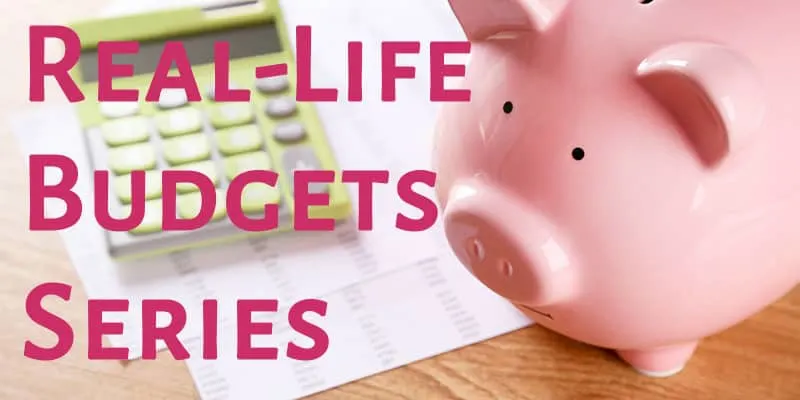Here’s #3 in the “Real-Life Budgets” series! Because of the popularity of my monthly budgets, I wanted to show some more variety with other real-life budgets for people in different circumstances.
I reached out to other bloggers who were willing to share their average monthly budget with you!
When we first started budgeting, it was hard to find examples of real life budgets. I think it can be helpful to see how others spend their money because you can think about how you would tweak things based on your specific circumstances.
Each real-life budget in the series shows how much a budget can vary based on location, family size, diet, priorities, income, debt…
You can take a look at our current $2500 per month budget here.
Sidenote: One of the very best things you can do to start getting a handle on your finances is track your spending! You can download and print my free spending tracker printable and take action today!
[convertkit form=980628]
So far, I’ve shared the budget of some early retirees as well as a couple living in Boston with big future plans.
Today’s budget comes from Ricky at Money Hero. He’s a single guy in his 20s who is working hard to pay off student loan debt. I think budgeting can be especially hard when you’re single because you don’t have the possibility of two incomes or someone to split expenses with, but Ricky is doing a fabulous job!
Basics About Ricky’s Budget
Family Size: One adult. Ricky is single with no kids.
Location: Florida
Job: Software Engineer
Ricky told me that his big priorities are his savings and paying off the $50k he owes on student loans. He used to live paycheck to paycheck but is now serious about his financial situation and he carefully tracks his spending.
Ricky’s Monthly Budget
Special Notes: I did not ask Ricky to share his income or any taxes that he has to pay. We’re simply looking at budgeted spending. He didn’t include his 401(k) contributions because those are pretax and come out of his paycheck. He also didn’t include his emergency fund. Ricky has a 3-month emergency fund that he doesn’t currently contribute to.
I’m going to let Ricky take it from here to explain his budget:
Rent: $845
Up until recently, I lived with one of my closest friends and we were splitting a 2-bedroom apartment. He’s getting married, so I’m moving into my own 1-bedroom, which is a couple of hundred dollars more expensive.
Car Insurance: $155
This one is killing me. This is for liability and the state minimum, and I don’t have any collision coverage on my car (my car is almost 10 years old). I had a minor accident 2 years ago and my rates doubled. I’ll be nearing the point where my rates drop again soon.
Cable: $30
I use PlayStation Vue for cable service, since it’s much cheaper than getting it packaged through a cable company. I may end up canceling it, because I don’t know if I actually watch as much TV as I think I do.
Phone Bill: $30
I have a discount on Verizon service through my employer.
Internet: $50
Internet service here isn’t too bad; the lowest $50 package is more than enough for my needs.
Utilities: $75
This includes electric and water, which I actually pay separately. This amount fluctuates depending on how much I actually use. These utilities can range anywhere from $50-$80.
Apple Music: $5
Gotta have my music. Apple Music is normally $10 a month for streaming music, but is $5 with a valid student email address.
You Need a Budget: $5
Absolutely necessary and worth the $5/month for this budgeting app. Couldn’t go without it.
Gasoline: $80
Student Loans: $370
$370 is the minimum payment I make to my student loans each month, but the amount I actually pay varies. When I have no other debts or bills to pay, I’ll put as much as I possibly can to my student loans.
Groceries: $200
Dining Out: $200
Looking to eventually cut this number down to $100, then $50.
Entertainment: $100
Movies, drinks, sporting events, etc. Things that I don’t do normally, but on occasion.
Business Expenses: $37
These are monthly recurring expenses that I have for Money Hero. This includes PicMonkey ($8) and ConvertKit ($29).
Roth IRA: $145
I use Vanguard for contributing to my Roth IRA, after tax.
HSA: $60
I’m fortunate in that I’m pretty healthy, so I don’t contribute too much to my HSA each month. When I get my debts under control, I’ll contribute more. I don’t pay a premium for health insurance.
Miscellaneous: $200
Anything that I forgot to budget for, or unexpected expenses. Car repairs, gifts, etc.
Total: $2587.00
Ricky is a personal finance blogger, entrepreneur, software engineer, and author and creator of MoneyHeroBlog.com. He teaches people how to manage their finances and make money, save money, and build a profitable blog.
A big huge thank you to Ricky for sharing his budget! I think he is doing an awesome job of focusing on knocking out his debt!
I know how easy it can be to let your income get eaten up so that there’s nothing left to pay extra on debt. We have that struggle now sometimes. He’s doing a great job of balancing the responsible stuff like paying off debt, saving for retirement, and putting money into an HSA while still having some money to go out and have fun with.
I have never tried YNAB (though I’ve heard about it multiple times) and I’m feeling inspired to try it out!
I love that he mentions using PlayStation Vue for cable service! We have used this on occasion when we wanted to get cable channels in (usually for the Olympics or when the weather get rough and we’re stuck inside in the winter). You can choose if you want it month to month (no contracts) and it’s very affordable. If you’re paying a ton for cable, I highly recommend looking into this.
I also found his budget super interesting because his total expenses are very similar to ours (around $2500 per month). It’s awesome to see how someone else spends the same amount of money in different ways. This is a great example of how to budget to pay off debt!
Other Budget Examples:
Our Actual Budget: Living on Less Than $1500/Month
The Fastest Way to Create Your First Budget
Our Unemployed Budget: $1200 Per Month



